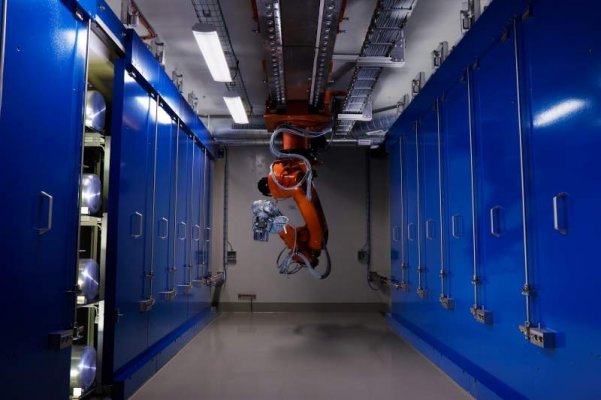
Radioactive targets temporarily stored by a robotic arm at CERN-MEDICIS's secure storage shelves
Photo: CERN
Scientists believe there’s more to discover in the field of nuclear medicine, but the challenges involved in securing a steady supply of radioactive isotopes that are of potential medical interest has been a restraining factor on research. The ISOLDE radioactive ion beam facility at European nuclear research facility CERN has been used to explore the use of radioisotopes in medicine since the 1970s, but limited access to ion beam experiment time and a lack of infrastructure to handle the radioactive resources needed for research has been an ongoing issue.
Thus, the CERN-MEDICIS project was born. The programme was launched in 2010 as a collaboration between CERN, the University of Leuven and a number of other academic and healthcare partners. The project aims to use ‘beam dumps’ that would otherwise be wasted in primary experiments as a source of new isotopes for medicine.
CERN-MEDICIS (Medical Isotopes Collected from ISOLDE) is a unique facility designed to produce unconventional radioisotopes with the right properties to enhance the precision of both patient imaging and treatment. It will expand the range of radioisotopes available for medical research – some of which can be produced only at CERN – and send them to hospitals and research centres in Switzerland and across Europe for further study.
2017 CERN-MEDICIS entered the commissioning phase, and produced its first isotopes on 12 December 2017.
The CERN-MEDICIS Collaboration formally kicked off 2018 with the first board meeting at CERN and the signature of the Memorandum of Understanding. The Collaboration Board, composed of experts in medical isotope production and research, and nuclear medicine, provides recommendations on submitted projects.
A consortium of two Latvian universities (RTU & UL) is on its way to join the MEDICIS collaboration, under the auspices of the MoES. The relevant MoU has been prepared, however, at the time of writing, it is yet to be signed. It is envisaged that this consortium, composed of the Institute of Biomedical Engineering and Nanotechnologies of RTU and the Faculty of Medicine of UL, both in a partnership with the Nuclear Medicine Centre, will contribute to MEDICIS with its expertise in medical physics, clinical radiology and rare nuclear isotope production.
More information on the project
H2020 programme: INFRA-2-2020 call
Implementation stage: pre-submission
Project partners: RTU, LU, Biomedical Engineering and Nanotechnologies Institute, Nuclear Medicine Centre
The project team of RTU:
Contacts: Jurijs Dehtjars ; Maija Radziņa m